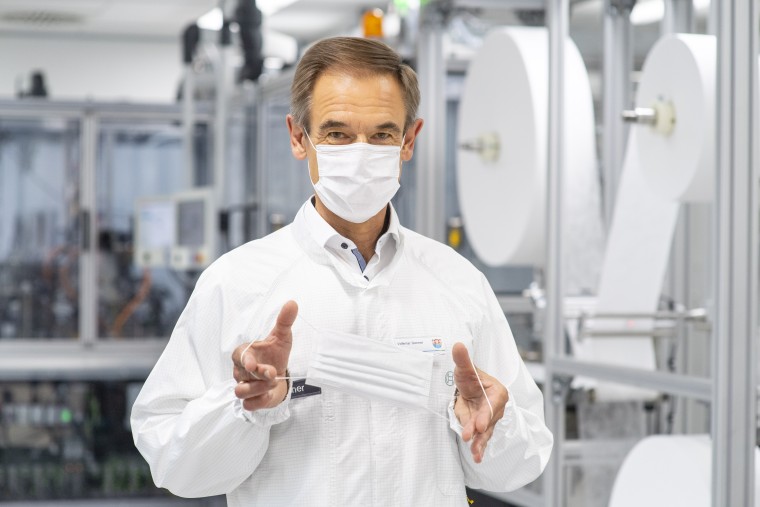15 May 2020
In the fight against coronavirus, Bosch has now turned its hand to the fully automated production of face masks. Dr. Volkmar Denner, chairman of the board of management of Robert Bosch GmbH, today launched the first special production line for face masks at the Bosch plant in Stuttgart-Feuerbach. “Containing coronavirus is a challenge for society as a whole. By equipping our associates with masks we make ourselves, we are helping to relieve the burden on the market. Moreover, we are doing the groundwork that will enable us to safely resume operations and protect our associates,” Denner says. Following a coordinated ramp-up that will run until the end of June, the company will make over half a million masks a day on five production lines at four locations worldwide. The lines were designed by Bosch’s special-purpose machinery unit. Bosch is making the design plans available to interested companies free of charge. Bosch has already received inquiries from over 30 companies regarding the designs of the special production line.
Bosch designs a production line for face masks
In combination with other hygiene measures, face masks are an effective means of reducing the risk of new Covid-19 infections. Developed by Bosch’s special-purpose machinery unit in just a few weeks, identical, fully automated production lines for face masks are now being set up at several company locations. In addition to the lead plant for Industry 4.0 in Stuttgart-Feuerbach, where two lines are planned, mask production will be ramped up at the Bosch locations in Naganathapura, India, and Juárez, Mexico, in successive weeks. A facility at the Rexroth plant in Erbach, Germany, will round off the manufacturing network. Overall, by the end of June, the production volume of the five lines is set to exceed ten million masks a month.
In-house production to relieve supply bottlenecks
The face covering is primarily intended to impede the spread of pathogens from the wearer’s nose and throat. At the same time, the mask acts as a barrier to bodily fluids produced by people in the immediate vicinity. Bosch is manufacturing surgical mask types I and II, which comply with the European DIN EN 14683 standard, and will use them mainly to protect its roughly 400,000 associates worldwide. Bosch wants to make any excess capacity available to third parties, provided there is demand and the masks satisfy country-specific standards. Furthermore, Bosch is making the designs, technical drawings, and assembly instructions of the lines available to other companies free of charge, as well as information about how the masks are packaged and distributed. “Our special production lines give us greater independence, since masks can be made directly on site, right where they are needed,” Denner says. Bosch’s special-purpose machinery unit offers interested companies expert advice and supplies complete systems on request. “Bosch is responding to coronavirus by developing technology. We are contributing our innovative strength and extensive manufacturing expertise,” says Rolf Najork, the Bosch management board member responsible for industrial technology.
Bosch’s special-purpose machinery unit provides tailored solutions
Part of the Industrial Technology business sector, Robert Bosch Manufacturing Solutions GmbH has been developing flexible and scalable plans for assembly systems, testing and process technology, and related services for 25 years now. Within the Bosch Group, the subsidiary plays a significant role. In the field of electromobility, for example, it is responsible for the final inspection of e-bike motors. With some 2,000 associates at nine locations worldwide, the services provided by the special-purpose machinery unit are tailored to the needs of both Bosch plants and external customers.





